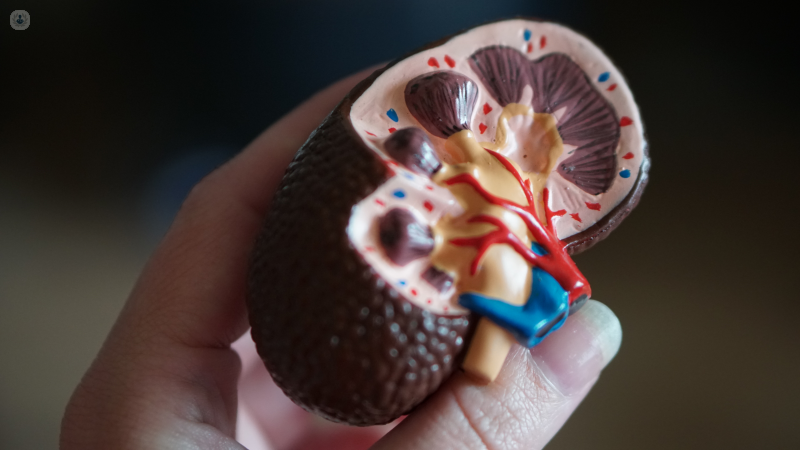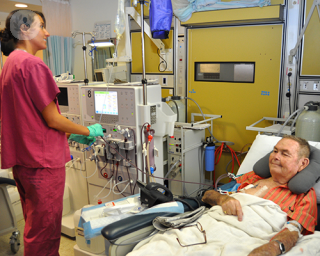What is chronic kidney disease (CKD)?
Chronic kidney disease, also known as chronic kidney failure, is where the kidneys do not work as well as they used to and are losing their function. CKD can get worse over time and can lead to the kidneys not working altogether resulting in the patient needing dialysis or kidney transplantation. Most people can have stable low kidney function and they may still be able to live somewhat relatively normal lives.

What are the symptoms of CKD?
In the early stages of CKD, there may be few signs or symptoms and it may be picked up if blood or urine tests detect a problem with the kidneys. This may happen when tests are undertaken for other problems.
The symptoms of CKD do not become apparent until there is significant impairment in kidney function. The signs and symptoms of low kidney function may include:
- Feeling sick, nauseous and vomiting
- Tiredness and weakness
- Swollen ankles and feet
- Difficulty with blood pressure
- Changes in how often you urinate
- Breathlessness
- Itching
- Hypertension (high blood pressure)
What are the causes of chronic kidney disease?
Kidney disease is caused by other health conditions that can put a strain on the kidneys. CKD can be caused by:
- Hypertension
- Diabetes
- Cardiovascular disease
- Kidney inflammation (glomerulonephritis) or vasculitis
- Genetic conditions affecting the kidney (Polycystic kidney)
- Long-term use of medications, such as lithium and anti infammatory medications
- Systemic illness such as Lupus
- Scaring in the kidneys from recurring upper urine tract infections
Tests for chronic kidney disease
Blood and urine tests can look for high levels of certain substances that show signs that the kidneys are not working properly. Over time, the test results can tell what stage of the disease that the kidneys are in.
Treatment of chronic kidney disease
There is no cure for chronic kidney disease but symptoms can be relieved to stop them from becoming worse. The main treatments include treating the underlying health conditions and also:
- Lifestyle changes to in order to stay healthy.
- Medication to help with problems, such as high blood pressure.
- Kidney dialysis, to replicate some of the kidney’s functions.
- Kidney transplant
01-11-2018 07-25-2023
Chronic kidney disease
Dr Bernhard Klebe - Nephrology
Created on: 01-11-2018
Updated on: 07-25-2023
Edited by: Conor Dunworth
What is chronic kidney disease (CKD)?
Chronic kidney disease, also known as chronic kidney failure, is where the kidneys do not work as well as they used to and are losing their function. CKD can get worse over time and can lead to the kidneys not working altogether resulting in the patient needing dialysis or kidney transplantation. Most people can have stable low kidney function and they may still be able to live somewhat relatively normal lives.

What are the symptoms of CKD?
In the early stages of CKD, there may be few signs or symptoms and it may be picked up if blood or urine tests detect a problem with the kidneys. This may happen when tests are undertaken for other problems.
The symptoms of CKD do not become apparent until there is significant impairment in kidney function. The signs and symptoms of low kidney function may include:
- Feeling sick, nauseous and vomiting
- Tiredness and weakness
- Swollen ankles and feet
- Difficulty with blood pressure
- Changes in how often you urinate
- Breathlessness
- Itching
- Hypertension (high blood pressure)
What are the causes of chronic kidney disease?
Kidney disease is caused by other health conditions that can put a strain on the kidneys. CKD can be caused by:
- Hypertension
- Diabetes
- Cardiovascular disease
- Kidney inflammation (glomerulonephritis) or vasculitis
- Genetic conditions affecting the kidney (Polycystic kidney)
- Long-term use of medications, such as lithium and anti infammatory medications
- Systemic illness such as Lupus
- Scaring in the kidneys from recurring upper urine tract infections
Tests for chronic kidney disease
Blood and urine tests can look for high levels of certain substances that show signs that the kidneys are not working properly. Over time, the test results can tell what stage of the disease that the kidneys are in.
Treatment of chronic kidney disease
There is no cure for chronic kidney disease but symptoms can be relieved to stop them from becoming worse. The main treatments include treating the underlying health conditions and also:
- Lifestyle changes to in order to stay healthy.
- Medication to help with problems, such as high blood pressure.
- Kidney dialysis, to replicate some of the kidney’s functions.
- Kidney transplant


Why do I keep getting urinary tract infections? Recurrent UTIs in women
By Mr Ali Omar
2024-11-21
Urinary tract infections (UTIs) are never fun, with patients suffering pain while urinating, frequent trips to the toilet, and abdominal pain. The worst part is that some people seem to get them again and again. What causes recurrent UTIs? Expert urologist Mr Ali Omar provides some answers to this common problem. See more


Chronic kidney disease: how beetroot juice and a healthy diet can help manage the condition
By Professor Liz Lightstone
2024-11-21
Chronic kidney disease is the term describing when the kidneys are not working properly. Leading consultant nephrologist, Professor Liz Lightstone discusses the possible causes, and how you can improve the health of your kidneys. See more


What conditions can dialysis help to manage and when is it needed?
By Dr Andrew Palmer
2024-11-21
The kidneys are responsible for filtering waste substances out of our blood and expelling them as urine. However, kidney failure can mean that a patient needs to have their blood filtered by a machine to survive. This is called dialysis. Respected nephrologist Dr Andrew Palmer is here to answer all the questions you may have about this procedure. See more


Understanding the link between high cholesterol and kidney disease
By Dr Christopher Lawrence
2024-11-21
For those who live with chronic kidney disease, it is known that these people have a higher incidence of cardiovascular diseases such as stroke or a heart attack. Top nephrologist Dr Christopher Lawrence explains when the link between high cholesterol and renal disease. See more
Experts in Chronic kidney disease
-
Professor Jeremy Levy
NephrologyExpert in:
- Chronic kidney disease
- Diabetic nephropathy
- Glomerulonephritis
- Polycystic kidney disease (PKD)
- Proteinuria (protein in the urine)
- Urinary tract infection
-
Dr Andrew Palmer
NephrologyExpert in:
- Chronic kidney disease
- Nephropathy (Kidney disease)
- Urinary tract infection
- Acute kidney injury (AKI)
- Dialysis
- Kidney transplantation
-
Dr David Game
NephrologyExpert in:
- Kidney transplantation
- Chronic kidney disease
- Dialysis
- Hypertension (high blood pressure)
- Acute kidney injury (AKI)
- Kidney stones
-
Dr Mark Thomas
NephrologyExpert in:
- Chronic kidney disease
- Hypertension (high blood pressure)
- Glomerulonephritis
- Diabetic nephropathy
- Acute kidney injury (AKI)
- Urinary tract infection
-
Dr James Pattison
NephrologyExpert in:
- Proteinuria (protein in the urine)
- Chronic kidney disease
- Urinary tract infection
- Kidney transplantation
- Diabetic nephropathy
- Haematuria (blood in the urine)
- See all

The Lister Hospital - part of HCA Healthcare
The Lister Hospital - part of HCA Healthcare
Chelsea Bridge Road, London
No existe teléfono en el centro.
By using the telephone number provided by TOP DOCTORS, you automatically agree to let us use your phone number for statistical and commercial purposes. For further information, read our Privacy Policy
Top Doctors

Westminster Bridge Consulting Rooms at St Thomas' Hospital Private Healthcare.
Westminster Bridge Consulting Rooms at St Thomas' Hospital Private Healthcare.
Westminster Bridge Road, London
No existe teléfono en el centro.
By using the telephone number provided by TOP DOCTORS, you automatically agree to let us use your phone number for statistical and commercial purposes. For further information, read our Privacy Policy
Top Doctors

Guy’s and St Thomas’ Private Healthcare
Guy’s and St Thomas’ Private Healthcare
Guy’s Hospital, Great Maze Pond
No existe teléfono en el centro.
By using the telephone number provided by TOP DOCTORS, you automatically agree to let us use your phone number for statistical and commercial purposes. For further information, read our Privacy Policy
Top Doctors
-
The Lister Hospital - part of HCA Healthcare
Chelsea Bridge Road, London , Central LondonExpert in:
- Cancer
- Cardiology
- Orthopaedic surgery
- Pregnancy
- Physiotherapy
- Women’s health
-
Westminster Bridge Consulting Rooms at St Thomas' Hospital Private Healthcare.
Westminster Bridge Road, London , SE1 South Bank LondonExpert in:
- General Surgery
- Orthopaedic surgery
- Plastic surgery, reconstructive and aesthetics
- Endocrinology
- Obstetrics and Gynaecology
- Paediatrics
-
Guy’s and St Thomas’ Private Healthcare
Guy’s Hospital, Great Maze Pond, SE1 South Bank LondonExpert in:
- Allergy
- Cardiology
- General Surgery
- Maxillofacial Surgery
- Thoracic Surgery
- Maternity care
- Most viewed diseases, medical tests, and treatments
- Autoimmune diseases
- Joint pain
- Nutrition
- Abdominal pain
- Vaginal cytology
- Parkinson's disease
- Biomarkers
- Kidney stones
- Osteoporosis
- Anxiety








